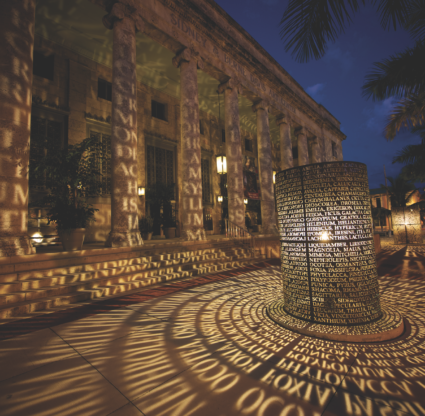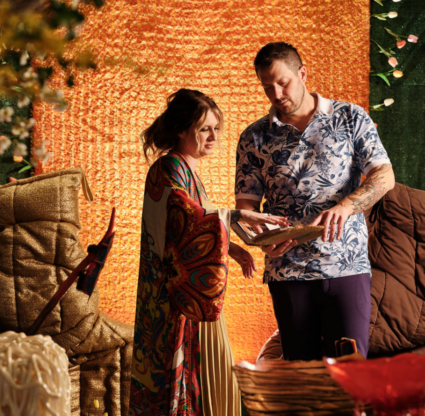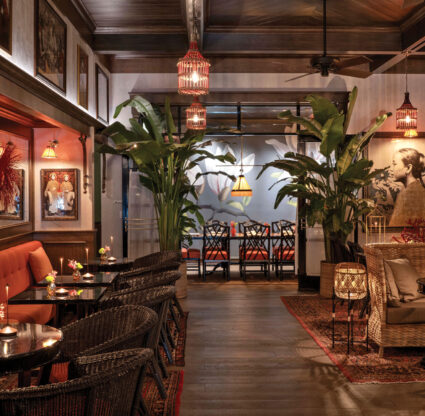On Tuesday mornings, in an oak-lined neighborhood deep in Old Naples, the sound of ragtime can be heard from the open windows of an unassuming brown house. The music, though, is anything but unassuming. Loud, boisterous, jubilant—it’s the kind of music that can be produced only by people who love to play.
Jim Gover, a retired dentist who’s in four local jazz bands, hosts these Tuesday morning jam sessions. Among the several dozen players gathered in Gover’s living room, there’s a retired podiatrist on drums, a former surgeon on banjo, a one-time school band director on clarinet, an owner of athletic clubs on guitar, a Washington think-tanker on trombone—not to mention a former member of Ray Charles’ band (and co-writer of I Got a Woman) on trumpet and the original pianist for the Broadway musical Cabaret on keys.
“Usually musicians who get together like this are teenagers,” Gover told me when I stopped by one of the sessions. “They have ambitions that they’ll get rich and famous, that they’ll get girls and drugs—not the cheap drugs, but the good drugs. We’re not ambitious. We’re not looking for fame or fortune. We’re looking for a good time.”
 Each session starts with coffee and doughnuts on the lanai—“I had to make them eat outside,” Gover tells me, “because they kept spilling coffee on the carpet”—and then moves into the music itself, a mix of ragtime, blues and Dixieland jazz that covers the 1900s to World War II. Gover says the music is old-fashioned, but then, “We’re old-fashioned.”
Each session starts with coffee and doughnuts on the lanai—“I had to make them eat outside,” Gover tells me, “because they kept spilling coffee on the carpet”—and then moves into the music itself, a mix of ragtime, blues and Dixieland jazz that covers the 1900s to World War II. Gover says the music is old-fashioned, but then, “We’re old-fashioned.”
Anyone is welcome at these sessions, players and listeners alike. Several years ago, midway through the jam, Gover heard a knock on the door. He thought, after all this time, a neighbor’s finally going to complain. But when he opened the door, it wasn’t a neighbor. David McCullough—two-time Pulitzer Prize winner and winner of the National Book Award—stood on his stoop.
“My wife and I love Dixieland music,” McCullough said. “Can we bring lawn chairs and sit in the grass some time?”
“Sit in the grass?” Gover said. “You have to come in and have doughnuts.”
Since then, McCullough has been stopping by the Tuesday jam sessions whenever he’s in Naples. On the morning of my visit, he happened to be in town.
As the musicians finished their coffee, they took up seats in the living room and started to tune. All the players there that morning—except the former Cabaret pianist—were men, and the atmosphere was raucous and bawdy.
“Bunch of degenerates on Tuesday morning,” one trumpet player said.
Gover stood in the center like a ringmaster and demanded everyone’s attention. He reminded them that McCullough would be stopping by to sing a few songs.
“And I want to remind you,” he said, “that whenever someone is singing, we have to follow them.”
“And whatever key they’re in,” someone called out from the trombone section.
 The drummer played a ba-dum-bum-ching and everyone laughed.
The drummer played a ba-dum-bum-ching and everyone laughed.
To get the band warmed up, Gover chose the first song: My Bucket’s Got a Hole in It, an upbeat funny tune with a chorus line that goes, “My bucket’s got a hole in it, can’t buy no beer.” From there they played other music from the early 1900s—Me and My Baby, Old Fashioned Love, I Can’t Believe That You’re in Love with Me—switching out musicians after every couple of songs.
In the middle of all this, McCullough arrived. The musicians continued to jam while Gover led him to the lanai and poured him a cup of coffee. Other players sat around the table outside, and the two men reminisced about the time McCullough discovered the jam sessions.
“I thought, ‘Boy, it’s pretty early to be having a party,’” McCullough said. “I thought it was a record then realized, that’s the real thing.”
One of the drummers, a man everyone called Dr. J, asked McCullough, “If I got my book, would you autograph it?”
“Hell, no,” McCullough said, but he was laughing, and when someone handed him a pen he seemed glad to sign.
When McCullough finished with the book, Gover stood and hooked a thumb at him. “I’m going to have to put him to work.”
 “You haven’t heard anything until you’ve heard this one,” Dr. J said to me.
“You haven’t heard anything until you’ve heard this one,” Dr. J said to me.
McCullough chuckled. “That’s why I love these guys. They lay it on thick.”
We moved inside where the musicians waited, and Gover passed McCullough a microphone.
“Nothing could be finer than to be in Carolina in the morning,” he sang, closing his eyes.
The drummer, in a voice like Louis Armstrong, called out, “Yeah, David McCullough.”
“No one could be sweeter than my sweetie when I meet her in the morning.”
McCullough moved through the lines with the band following him, and when they reached the end Gover made a twirling motion in the air with his finger.
“One more time,” he said.
McCullough took up the lyrics again, the musicians kept jamming, and that sound—that loud, raucous, ebullient sound—poured through the open windows.





